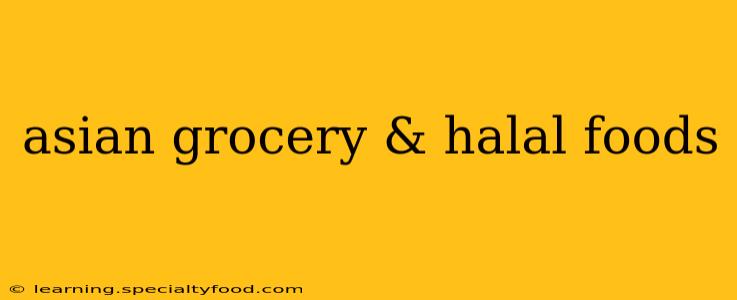The vibrant tapestry of Asian cuisine, with its diverse flavors and traditions, intersects beautifully with the principles of Halal dietary laws. Finding both Asian groceries and Halal-certified products isn't always straightforward, but with a little knowledge and know-how, you can easily create authentic and ethically sourced Asian dishes at home. This guide explores the intersection of these two important aspects of food culture, providing insights into sourcing ingredients and navigating the sometimes confusing landscape of Halal certification.
What are Halal Foods?
Halal refers to permissible food and beverages according to Islamic law. The most crucial aspect is that the food must be permissible under Islamic teachings. This generally means:
- Meat from permissible animals: This includes animals that have been slaughtered according to Islamic ritual (Zabiha), ensuring a quick and painless death. Common Halal meats include beef, lamb, goat, and chicken. Pork is strictly forbidden.
- No blood: Blood must be completely drained from the meat.
- No intoxicating substances: This includes alcohol and drugs.
- Cleanliness and hygiene: The entire process of food production, from slaughter to packaging, must adhere to strict hygiene standards.
Many Asian grocery stores cater to Muslim communities, often offering a wide selection of Halal-certified meats and other products. However, it's always advisable to check for the Halal certification logo to ensure compliance.
Where to Find Asian Grocery & Halal Foods?
Locating both Asian ingredients and Halal certifications can require some exploration, but several avenues exist:
- Specialized Halal Asian Grocery Stores: Many cities have dedicated stores that specialize in both Asian groceries and Halal products. These stores often stock a wider variety of items and can be a great resource.
- Larger Supermarket Chains: Increasingly, major supermarket chains are incorporating Halal sections into their stores, particularly in areas with significant Muslim populations. Look for clearly labeled Halal sections or ask store staff for assistance.
- Online Retailers: Online grocery stores offer a vast selection of Asian and Halal products, often with detailed information about certifications and sourcing. This can be particularly convenient if a dedicated store isn't readily accessible.
- Ethnic Enclaves: Areas with large Asian or Muslim populations often boast a multitude of smaller, independent grocery stores that offer both Asian ingredients and Halal meat options. These stores often offer a more personalized and authentic shopping experience.
What Asian Ingredients are Commonly Halal?
The vast majority of common Asian ingredients are naturally Halal, including:
- Vegetables & Fruits: Most vegetables, fruits, rice, noodles, and spices are inherently Halal.
- Soy Products: Soy sauce, tofu, and tempeh are generally Halal, although always check the label to ensure no animal-derived ingredients are present.
- Nuts & Seeds: These are usually Halal, but always check the label for potential cross-contamination in processing facilities.
- Oils: Vegetable oils like coconut oil, sesame oil, and sunflower oil are generally Halal.
However, always remember to read labels carefully as some products might contain non-Halal ingredients like alcohol or animal-derived additives.
What about Asian sauces and condiments?
Many Asian sauces and condiments, such as soy sauce, fish sauce, and oyster sauce, are not Halal due to the presence of fish or other non-Halal ingredients. Look for Halal-certified alternatives or opt for vegetarian/vegan versions.
How can I ensure the meat I buy is truly Halal?
Always look for a recognizable Halal certification symbol on the packaging. Different regions may have different certification bodies, but the presence of a certified logo provides assurance that the meat was slaughtered according to Islamic guidelines.
Are there specific Asian dishes that are naturally Halal?
Many traditional Asian vegetarian dishes are inherently Halal. Examples include vegetable curries, stir-fries, noodle soups (without meat broth), and various rice dishes.
What are some common challenges in finding Asian grocery and Halal food?
Challenges can include limited availability in certain regions, inconsistent Halal certification practices, and potential language barriers when communicating with store staff.
By carefully checking labels, asking questions, and exploring different sourcing options, you can easily create delicious and ethically compliant Asian dishes that meet both your culinary and religious needs. Remember, the journey of discovering new flavors while upholding Halal principles is a rewarding one!
